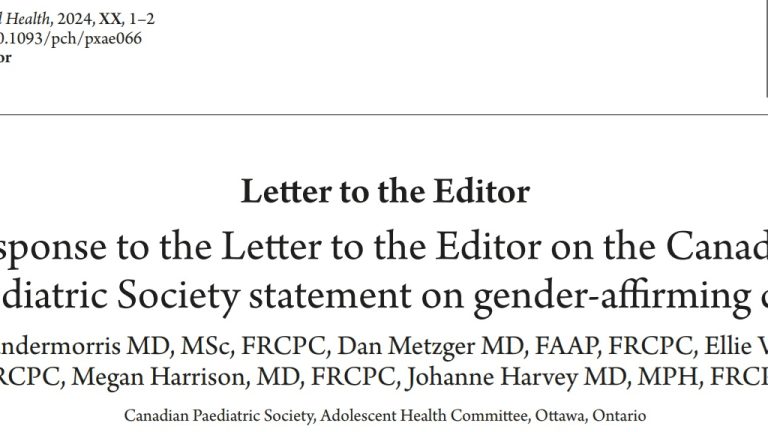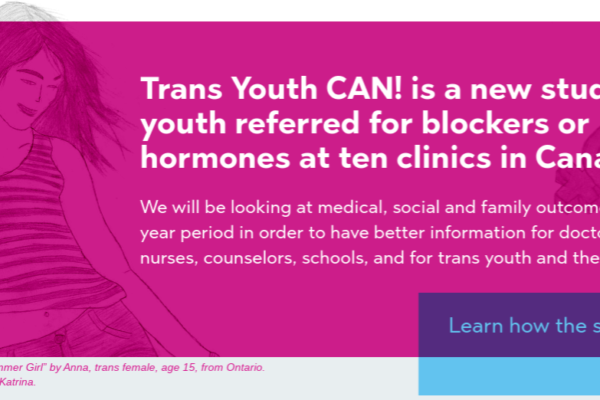The Canadian Paediatric Society (CPS) is doubling down on gender-affirming care with a new statement that contains several concerning assertions and falsehoods. Canadian clinicians representing the CPS position statement on gender-affirming care openly disparaged the Cass Review, calling it a “critique” and the work of a “single individual” and have misrepresented the quality of the methodology used to gather and assess the available evidence on gender-affirming care. This is cause for concern for any parent and young person navigating the difficult decisions involved in determining whether or not to pursue medicalization for managing gender-related distress.
In April of this year, the Cass Review, commissioned by the National Health Services of England, was published. The extensive review took 4 years to complete and included over 1000 interviews of stakeholders and 9 studies including new systematic reviews of the evidence. The recommendations outlined in the Review, which are consistent with Finland and Sweden’s guidelines on gender-affirming care (GAC), were swiftly adopted by the UK.
On October 7th, the Canadian Pediatric Society’s flagship journal, Pediatrics and Child Health published a letter to the editor penned by three respected Canadian pediatricians and a research psychologist calling for a reassessment of their position statement endorsing the gender-affirming care model for young people experiencing gender distress given the findings of the Cass Review.
We’re disappointed, though not surprised, that the CPS has doubled down on their position statement promoting gender-affirming care. Any acknowledgment that the Cass Review and its research findings have value for Canada would be an admission that all is not well in the Canadian context and that Canada has indeed strayed from evidence-based care of children and young people.
It is clear in this new letter that the authors of the CPS position statement on gender-affirming care are incapable and unwilling to acknowledge the work of the Cass Review. They claim that “there are significant limitations, biases, and inaccuracies within the Review” and that “ the Review has been noted to include incorrect citations of evidence and inaccurate, sometimes scientifically disproven speculations”.
The authors put forward completely inaccurate remarks about the Cass Review such as the claim that the systematic reviews commissioned by the Cass Review excluded studies that were not randomized control trials when in fact the systematic reviews considered and evaluated all types of studies.
The response relies heavily on two non-peer-reviewed critiques of the Cass Review both of which contain multiple mischaracterizations and errors. The first, by Dr. Meredithe McNamara et al. distributed by the “Yale Integrity Project” has come under fire. It highlights just how far some people will go to disparage an evidence-based approach to gender medicine. As outlined in a recent British Medical Journal article, the “Yale paper” is intended for legal (rather than clinical) purposes and it jeopardizes the implementation of crucial reforms in the care of gender dysphoric youth.”
The Yale response to the Cass Review was developed to protect clinicians from being sued in the US who’ve been implementing gender-affirming care. Obviously, this lens on the Cass Review will attempt to disparage their findings, as the intent is to win in a court of law, not to protect children from harm with a neutral and objective stance of understanding the evidence. We find it extremely disturbing that the Canadian clinicians promoting gender-affirming care for children and young people here in Canada would rely on this kind of document to make their case.
The CPS authors also assert that “ the model of gender-affirming care in Canada differs in many ways from the approach that had been in place in the UK.” This is a shocking statement and reveals how little the CPS and the clinicians they’re relying on to inform their position on gender-affirming care understand about the approaches in place in Canada.
There is no single approach to the model of care for gender-affirming care in Canada. We acknowledge that some children who insist that they are a different gender from a very early age may receive a holistic model of care, but we also believe that this arises from the fact that they are too young to start on puberty blockers in any case. Most teens can easily access puberty blockers or cross-sex hormones from various clinics and a growing number of family physicians who are offering “LGBTQ+ friendly” services in our communities. Radio Canada has proven that a 14 year old can get a prescription for Testosterone at a first visit in less than 10 minutes. Young women who received double mastectomies as part of their gender-affirming care in Canada are now using public fundraising sites to pay for reconstructive surgeries.
Are the CPS authors trying to pull the wool over the eyes of Canadians? “Nothing to see here” seems to be the gist of their response. We expect more from the medical society entrusted with the health and well-being of Canadian children.
The only objective truth in this response by the CPS authors is the admission that their position statement on GAC is not a clinical practice guideline. Yet it is the only Canadian medical society official position on gender-affirming care.
“The CPS position statement is just that – a position statement.
It did not endeavour or claim to serve as a clinical practice guideline.”
– CPS clinicians responding to a letter requesting a review given the Cass Review findings
We agree with the authors that the situation in which clinicians are being asked to provide care to gender-distressed children and young people in Canada is a “situation with recognized unknowns”. In light of these unknowns, and the lack of evidence supporting the gender-affirming model of care, we would have expected the CPS to acknowledge the need for more oversight. At a minimum, the Canadian healthcare systems should be tracking the outcomes and conducting robust follow-ups with those who have been put on puberty blockers, and cross-sex hormones or who have had gender-affirming surgeries. There is currently no requirement to do so and we know from extensive coverage of family situations across the country that this is not happening as a matter of course.
The CPS could have taken this opportunity with their response to suggest this kind of very reasonable step forward to ensure that the model of care they trust is happening in the Canadian context is, in fact, safe. We believe their unwillingness to acknowledge or support such a reasonable requirement reveals that the Canadian system has been captured by ideology, just as the UK system was.
The CPS has been ignoring the Cass Report and its implications for the care of young gender-distressed people evidence-based gender medicine here in Canada. A session at the 2024 CPS national conference on gender-affirming care did not even mention the Cass Report and its findings. We would have expected if this medical body was interested in evidence-based medical care for gender-distressed youth, that session at their national conference for pediatricians in Canada would have contained a thorough discussion of the systematic reviews of evidence commissioned by the Cass Review, and acknowledgment of the diminishing support for medicalization of minors with puberty blockers and cross-sex hormones based on the best quality evidence available worldwide.
Meanwhile in the UK, the Labour government and all of the medical societies that regulate the profession have come out in support of the Cass Review and implementing its recommendations. Earlier this week, the UK Government Charity Commission published the results of their inquiry into Mermaids, an organization that had been promoting gender-affirming care, openly disparaging the Cass Review, promoting gender identity ideology in schools and mailing chest binders to young girls. The government stated that Mermaids must revise their public position on puberty blockers and other gender affirming promotions:
“Additionally, following the Cass Review, we have required Mermaids to present a more accurate picture on its website as to the risks involved in the use of puberty blockers, and to follow Cass Review findings on the involvement of parents in social transitioning as regards any future provision of chest binders to children.”
- UK Government Charity Commission Inquiry into Mermaids
Stunning Difference between UK and Canada Protection of Children
The difference between the UK and Canada’s protection of children from the harms of gender-affirming care is absolutely stunning. The Canadian Pediatric Society is acting like an LGBTQ+ charity, not the medical society that we entrust to guide our healthcare system on critical decisions concerning the health and well-being of Canadian children.
We are shocked and disgusted at the lack of objective interest and outright disdain that the CPS has exhibited toward the Cass Review, its 9 new systematic reviews of evidence and its recommendations for caution in light of the lack of evidence supporting the efficacy and safety of medical interventions such as puberty blockers.
Given this new response by the CPS clinicians responsible for their position statement on gender-affirming care, we do not have confidence in the CPS to inform the medical profession about the risks and benefits of medical interventions for minors such as puberty blockers, cross-sex hormones, and gender-affirming surgeries. An independent and robust national review is needed to develop a clinical practice guideline for the Canadian context that ensures young people with many complex presentations of gender distress are safeguarded from harm.





One thought on “Canadian Paediatric Society on a Mission to Try to Tarnish Cass Review”